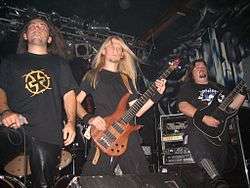Trauma (Polish band)
Trauma (formerly Thanatos) is a Polish death metal band formed in 1986 in Elblag. The band plays energetic technical music with an emphasis on colorful guitar techniques and extremely accurate kick fast on drums. Trauma has ranked among the top bands in the Polish death metal scene. On July 23, Trauma has announced that they are going into studio to record their new album on their Facebook page.[1]
Trauma | |
|---|---|
 Trauma during a concert in 2006 (From left: Robert Jarymowicz, Paul Krajnik, Chris Dino" Wojdas) | |
| Background information | |
| Origin | Poland |
| Genres | Death metal, Speed metal |
| Years active | 1986 - present |
| Labels | Pagan Records, Empire Records |
| Website | http://trauma.art.pl |
Members
- Current line-up
- Arkadiusz "Mały" Sinica – drums
- Jarosław "Mister" Misterkiewicz – guitars
- Artur "Chudy" Chudewniak – vocals
- Former members
- Piotr Zienkiewicz – bass, vocals
- Jacek "Skocz" Holewa – vocals
- Arkadiusz Furdal – guitars
- Paweł Kapla – bass
- Paweł "Firana" Krajnik – bass
- Patryk "Patrix" Krajnik – guitars, vocals
- Filip "Fill" Musiatowicz – guitars
- Robert "Kopeć" Jarymowicz – vocals
- Dawid "Davidian" Rutkowski – bass
- Andrzej "Wasyl" Wasiukiewicz – drums
- Zbigniew Kunicki – guitars
- Wojciech "Bubi" Sukow – bass, vocals
- Bartek "Winiar" Winiarski – vocals
- Current live members
- Tomek Myśliński – bass
- Krzysztof "Dziadek" Dobrowolski – bass, guitars
- Former live members
- Paweł "Pery" Perwejnis – bass
- Przemysław Ozga – guitars
- Konrad Rossa – guitars
- Krystian "Dino" Wojdas – guitars
Discography
As Thanatos
- Deo Optimo Maximo (DEMO) - 1989
- Out of Sanity (DEMO) - 1990
As Trauma
- Invisible Reality (DEMO) - 1992
- Comedy Is Over - 1996
- Daimonion - 1998
- Suffocated In Slumber - 2000
- Crash Test (LIVE) - 2001
- Imperfect Like A God - 2003
- Determination - 2005
- Hamartia (EP) - 2006
- Neurotic Mass - 2007
- Archetype of Chaos - 2010
- Karma Obscura - 2013
- Ominous Black - 2020
gollark: No, which is probably for the best.
gollark: This is called an "autoformatter" and it already "exists".
gollark: Try knowing Macron more.
gollark: Unfortunately, the macro is 1.3GB, although it *is* very elegant.
gollark: Although it *is* impressive that it's possible to express the entire text editing workflow in one glorious macro.
References
Sources
This article is issued from Wikipedia. The text is licensed under Creative Commons - Attribution - Sharealike. Additional terms may apply for the media files.